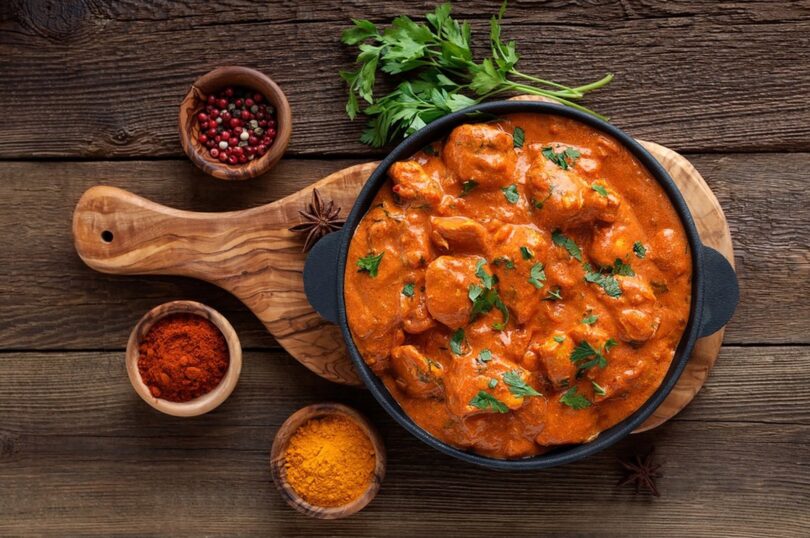NEW DELHI (AFP) : Acontentious dispute has arisen over butter chicken, a beloved dish in India, with two restaurant chains claiming to be its original creators. This marinated chicken delicacy, enveloped in a rich red sauce with generous amounts of butter and cream, enjoys widespread popularity across continents, featuring prominently on menus in London, New York and Sydney.
However, this culinary feud has escalated to a legal battle, as Moti Mahal, one of Delhi’s oldest restaurant chains, has filed a lawsuit against its rival, Daryaganj, in the Delhi High Court. The roots of this conflict trace back a century to pre-independence India, highlighting a long-standing feud between the families involved.
The extensive 2,000-page lawsuit alleges that Moti Mahal’s founder was the first to concoct the butter chicken recipe, ingeniously incorporating a flavorful tomato-based gravy to tenderize leftover chicken pieces.
Moti Mahal further accuses Daryaganj of wrongfully claiming credit for inventing butter chicken and dal makhani, a lentil-based dish slow-cooked in a creamy tomato gravy. Seeking 20 million rupees ($240,000) in damages, Moti Mahal urges the court to prevent Daryaganj from laying claim to their family’s culinary heritage.
While Daryaganj’s owners contemplate their response, the legal proceedings continue, with the next court hearing scheduled for May.
Too many cooks
Monish Gujral, the owner of Moti Mahal, emphasized that his grandfather was the creator of butter chicken, supported by documentary evidence. “It’s a well-documented fact globally that we are the inventors of butter chicken and dal makhani,” Monish, 57, told the Agence France-Presse (AFP) during a bustling afternoon at one of his outlets in Delhi.
He clarified: “We are not claiming that you can’t serve butter chicken in your restaurant, but don’t say you invented the dish. I would not allow anyone to take our legacy away.”
Monish traced the origins of butter chicken to his grandfather Kundan Lal Gujral, who learned cooking in a sweet and sherbet shop in Peshawar, present-day Pakistan, before establishing a restaurant in 1920. Among his culinary experiments was the addition of a creamy sauce to bits of tandoori chicken to prevent them from drying out.
In the aftermath of the partition of the Indian subcontinent in 1947, Kundan Lal Gujral relocated to Delhi where he founded the first Moti Mahal restaurant, which became a renowned culinary institution. Notable patrons included former Prime Minister Jawaharlal Nehru and independence activist Maulana Azad, along with international figures like former U.S. President Richard Nixon and former first lady Jackie Kennedy.
However, conflicts arose when Kundan Lal Gujral appointed his cousin Kundan Lal Jaggi as a partner. Jaggi’s descendants, who later established the Daryaganj chain, claimed that he invented butter chicken in 1947 to accommodate late-night customers with limited tandoori chicken pieces, adding a gravy to ensure everyone could enjoy a satisfying meal.
Monish rejected his rivals’ claims, asserting that they merely appropriated his family’s legacy. “We have been in the business for 100 years,” he stated, pointing to black and white photos of dignitaries adorning the restaurant’s walls. “They have copied our feel and look.”
Sticky dispute
This is not the first dispute over the origins of a renowned Indian dish. In 2018, the Delhi High Court ruled against imitators claiming ownership of the popular kebab dish “Tunday Kababi.”
Odisha and West Bengal both assert ownership of rasgulla, a syrup-soaked cheese ball dessert. Internationally, conflicts have arisen over various dishes, from kimchi and hummus to biryani, jollof rice and chicken Kyiv.
However, for diners like Rubina Kapoor, the inventor of the dish holds no significance. “I have traveled from London to eat butter chicken here,” she said, savoring a spoonful of the creamy gravy at Moti Mahal. “For me, butter chicken is love, it’s childhood memories. Nothing else matters.”







